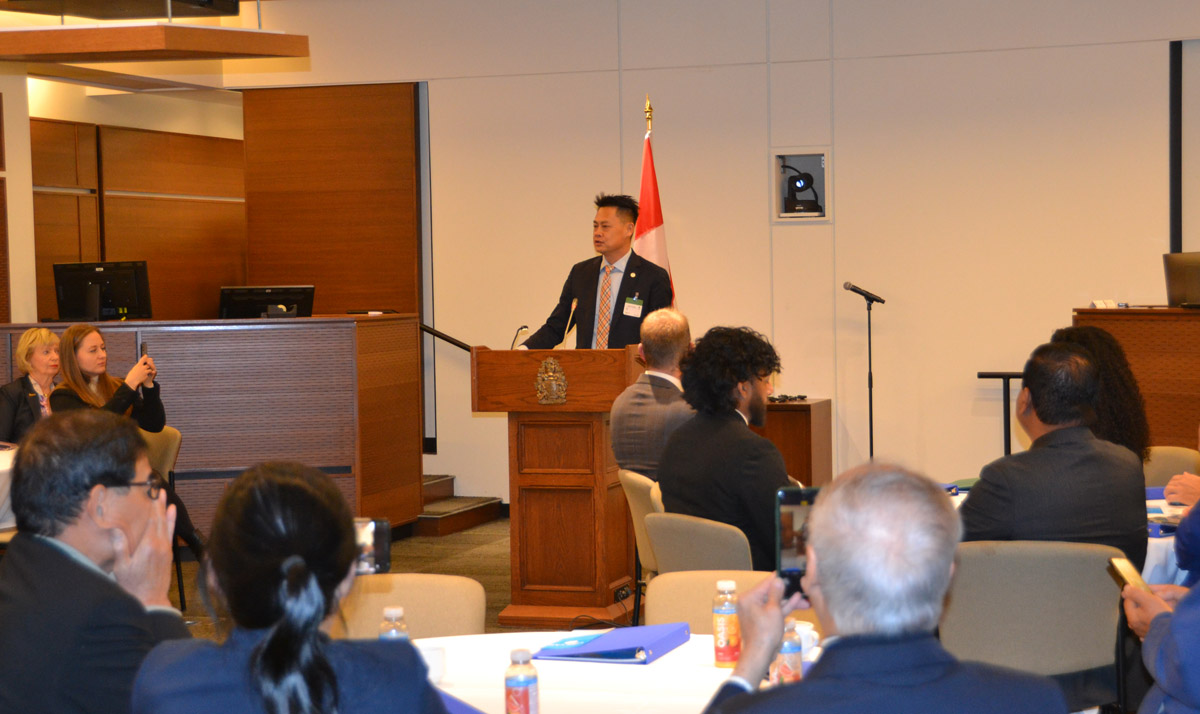On October 27, 2022, Viet Tan hosted a reception at the Canadian Parliament co-chaired by the Honorable Judy Sgro. The theme of the event was how Canada could help advance peace and prosperity in the Asia-Pacific by supporting human rights and democratic change in Vietnam.
The reception was attended by MPs from the Liberal Party, Conservative Party, and Bloc Québécois.
Below are the remarks from Viet Tan executive director Duy Hoang.
***
Members of Parliament and friends, thank you for joining us at today’s reception. And thank you MP Judy Sgro for co-chairing this event and for your longstanding support for human rights.
I wanted to share with you Viet Tan’s vision for Vietnam, how this vision may relate to the interests of Canada in the Indo-Pacific, and what we could do to promote our shared interests — which I believe to be a more free and democratic Vietnam.
I think the best way to describe Vietnam today is like a cup of water — in many ways half full:
- with a dynamic, hard working people
- a strategic location
- and of course great food and vibrant culture
But Vietnam is also like a glass of water half empty:
- with uneven development
- staggering levels of corruption and political repression
- hundreds of political prisoners
- and so many contradictions: the government wants to promote a knowledge economy but restricts the internet; it talks about climate change but detains environmental activists who are organizing for change
In a nutshell, it’s a country with tremendous potential but is held back by an authoritarian system — namely, a single, ruling party that’s no longer Marxist, but still very Leninist.
This is not news that Vietnam’s political system is less than ideal — it may even seem like an oddity that the rest of the world can safely ignore. But we’ve been reminded this year that autocracy just can’t be wished away. How a regime treats its own people is highly relevant to its immediate neighbors and the wider international community.
With the invasion of Ukraine, we’ve seen how a tyrant with a warped world view can cause so much suffering to his neighbors, to his own people and can literally endanger the rest of the world.
And with China, we’ve seen how an authoritarian regime is both a threat to the citizens living inside its borders and also to the whole region.
Fortunately, much of the world has rallied behind Ukraine — and more and more leaders are providing their support to a democratic Taiwan. But there is a number of countries, almost all with poor human rights records, that are an obstacle to the international consensus. The Socialist Republic of Vietnam is one such country.
In every vote of the United Nations General Assembly this year condemning the Russian invasion of Ukraine, the atrocities against civilians and the illegal annexation of Ukrainian territories, the Hanoi government has abstained.
It would seem that the interests of Vietnam align with an international system where countries respect the UN Charter and where bigger nations don’t bully smaller neighbors. However, because of their autocratic nature, the Hanoi regime seems unable to act in the national interest.
In fact, Hanoi is destabilizing the region by planning military exercises with Russia, siding with the military junta in Myanmar, and most recently joining the UN Human Rights Council to whitewash human rights abuses.We, Viet Tan, envision a Vietnam that embraces international norms and a rules-based order. This Vietnam would anchor a more liberal ASEAN — which in turn could help moderate Beijing’s worst tendencies.
Such a Vietnam would more easily attract the talents and support of the large Vietnamese diaspora — including the hundreds of thousands of Canadians who are 1st and 2nd generation immigrants from Vietnam. This community could serve as a bridge between the two countries, deepening Canada’s position as an Indo-Pacific nation and ultimately its soft power.
So what can we do?
First, don’t give the Hanoi regime a “pass”. This means urging the Hanoi government to respect its international commitments; it’s now a member of the UN Human Rights Council — with this role comes responsibilities.
Second, speak out further against human rights abuses. For example, MPs might consider “adopting” a prisoner of conscience and advocating for their freedom.
Third, pursue a relationship with the Vietnamese people. Canada has the opportunity to engage directly with the Vietnamese people, by supporting independent Vietnamese civil society. This is an area where the Canadian diplomatic mission could enhance its current efforts.
As Canada prepares its Indo-Pacific Strategy, we all agree that Vietnam has an important part to play. The question is which Vietnam would be a more reliable partner? We believe that a more free and democratic Vietnam is in all of our interests.
Thank you for your support.
Duy Hoang
